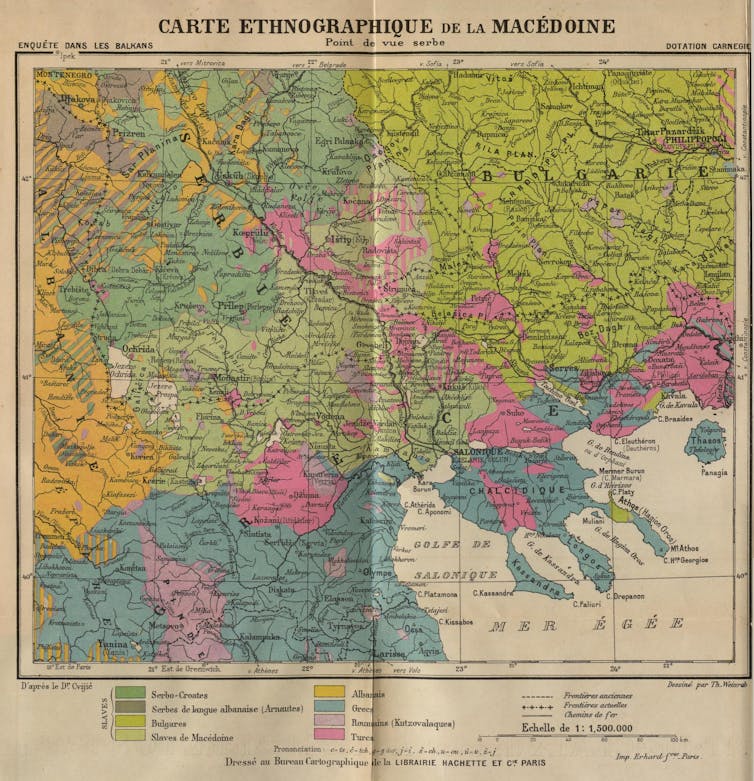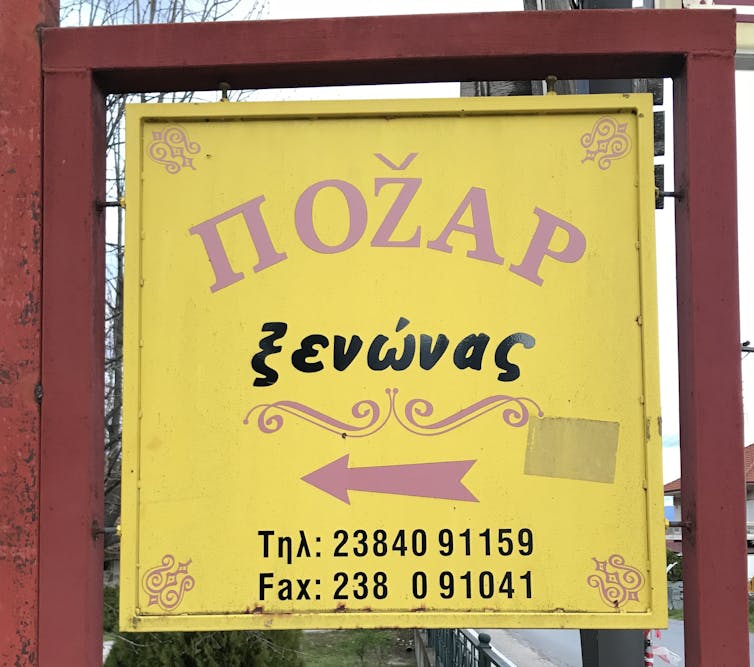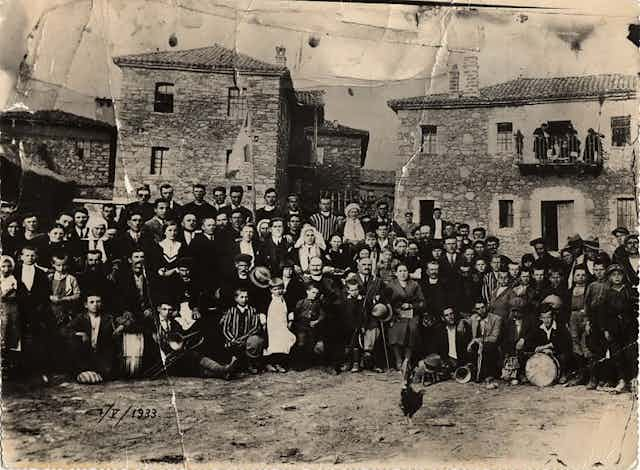If you’ve ever been to a traditional Greek celebration, you will have seen people joining hands and dancing in a circle following the same steps to the accompaniment of live music. You will also have heard songs sung in Greek as most traditional tunes go hand in hand with lyrics talking about love, emigration and rural life.
In the northernmost parts of the Greek regions of Western and Central Macedonia, however, all the folk dances are instrumental tunes. Lyrics have been replaced by loud, brass and woodwind instruments like the cornet, the trombone and the clarinet. This is not some peculiar aspect of the local musical heritage. Traditional tunes in these regions had their own words – but they were in a language that the Greek state has tried to wipe out for nearly a century: Macedonian Slavic.
After emerging victorious from two Balkan Wars in 1912 and 1913, Greece’s territory and population expanded dramatically by the addition of the lion’s share of the historic geographical region of Macedonia, the part found on the southern side of the Voras/Nidže and Belles/Belasica mountain ranges.
As is often the case in history, state borders did not coincide with linguistic ones. The so-called “New Lands” were a diverse mosaic of different linguistic groups, including 260,000 people who spoke varieties of a south Slavic language they called tukasni “local”, nashta “ours” or makedonski “Macedonian”.
These varieties, including the standardised version that is today the official language of FYR Macedonia, have similarities with Bulgarian – and many people in Bulgaria view them as Bulgarian dialects. But sociolinguistics has shown that what counts as a language in its own right and what is seen as a dialect of a language are essentially decided by political rather than linguistic criteria.

From an invisible language…
For the Greek government, having people speaking Macedonian Slavic in its territory did not sit well with its national ideology. Signs of discomfort towards Greece’s new multilingual reality showed very early on. In 1920, the Greek statistical authority ran the first census after the country’s territorial expansion. A language question was asked but the data for the Macedonia division were never published. The language data for the Thessaly division, however, record speakers of Macedonian Slavic, probably reported by seasonal workers from Macedonia who were in Thessaly at the time of the census. Greek authorities acknowledged the presence of Macedonian Slavic as a legitimate language but made a conscious effort to conceal the number of people who spoke it.
In the north of the country, authorities launched a massive Hellenising mission. Overnight, Madeconian Slavic names of people, places and dances were rendered into Greek by public servants.
My own paternal grandfather’s family name became Karatsareas from Karachorov. My maternal grandfather’s one became Kantzouris from Kanzurov. The area of Karadzova was renamed Almopia with its main town of Subotsko becoming Aridaia. The dance Puscheno was called Leventikos or Lytos. The aim was to leave no visible trace of Macedonian Slavic in public records.
…to a forbidden one
In the 1930s and in a climate of competing nationalisms in the southern Balkans, the similarities between Macedonian Slavic and the languages of the then Kingdom of Yugoslavia and Kingdom of Bulgaria began to raise suspicions among Greek authorities about the national allegiance and “consciousness” of Macedonian Slavic speakers.
Read more: Who gets to use the name 'Macedonia'? A decades-old row still to be resolved
In August 1931, Greek journalist and subsequent politician Periklis Iliadis called in his newspaper column for a ban on greeting in “Bulgarian” and publicly singing songs in languages other than Greek – two proposals that Ioannis Metaxas’s fascist regime promptly adopted.
In 1936, the governor-general of Macedonia issued order of prohibition 122770: “On the restoration of the uniform language”, banning the use of Macedonian Slavic in both public and private. People caught speaking Macedonian Slavic – sometimes by police officers eavesdropping through people’s windows – were dragged to military police stations where they were beaten and sometimes tortured. Those who had the money were fined. Teachers beat pupils who spoke Macedonian Slavic in class or in the playground – even when that was the only language they were able to speak. This happened to my maternal grandmother.
A muted heritage
In 1994, Human Rights Watch called for Greece to end harassment of Macedonian Slavic speakers. In 1998, the European Court of Human Rights ruled that Greece violated the right of its citizens to form associations by refusing them permission to establish a Macedonian Slavic cultural association. But these calls came much too late.

In the face of the aggressive and violent oppression they suffered in the 1930s, Macedonian Slavic speakers developed a deeply ingrained fear of speaking their language in front of people they did not know and trust. They stopped singing their songs, playing only the traditional tunes of their musical heritage. With time, they started using Greek more to refer to themselves and the places where they were born and live.
Today, only older people speak the language. For younger people, it is more of a passive knowledge – a kind of heritage that will die out with the older generation and the only thing that will remain to remind them of it will be a handful of words and tunes to which young musicians do not know the words.
Banning minority languages
This sort of linguistic oppression is far from unique. Similar stories have been reported by speakers of Irish in Ireland, Scottish Gaelic in Scotland, Welsh in Wales (read Susan Elan Jones’s comments in Column 377), Catalan in Spain, Native American languages in the US and Aboriginal languages in Australia.
It is sad that the efforts of state authorities to make speakers of minority languages assimilate to the majority language were for the most part successful. And alongside the languages, other expressions of culture are being lost, including place names, family names, songs, dances, games and traditions. Linguistic oppression and the consequences it has on speakers of minority languages and their cultural heritage have no place in a modern world where the value of cultural diversity is recognised.
Read more: Multilingualism must be celebrated as a resource, not a problem

